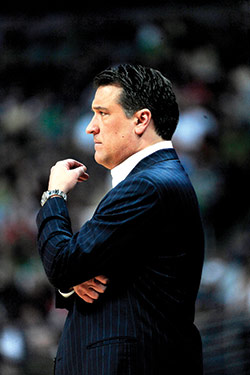
“It is as Coach Wooden always said, ‘Take away what means the most.’ ” St. John’s coach Steve Lavin, probably the most slickly pedagogical and conspicuously philosophical guy in college sports, is devouring an organic-egg-and-turkey-bacon sandwich at a cash-only coffee shop on the fringes of Soho and talking about the long “sabbatical” he took from coaching basketball after being fired from the head job at UCLA in 2003. “I was 32 when I was handed the keys to the Bruins—the Yankees of college basketball,” he says. “But despite my success, all people could see was my age and my slicked hair. As Hemingway wrote, ‘Many are strong at the broken places.’ So I have evolved and changed.”
If Phil Jackson is the NBA’s Zen master, the 49-year-old Lavin is college hoops’ Zen televangelist, spouting platitudes in an antic, camera-friendly, gesticulating patter. When I meet him this morning, a few hours before practice, it has been almost four years since St. John’s had resuscitated his coaching life, which just about everyone in the sport had left for dead. “I am the only one who has taken that much time away from coaching at the high-major level,” he says. Since his hiring, Lavin has landed top-ranked recruiting classes, engineered the program’s first NCAA-tournament appearance in over a decade, and helped put together a team, this year, with the potential for a deep NCAA-tournament run. “With our personnel and style of play, I believe we can create a symphony,” he says. “Just like musicians, I want guys who can play and go make good music.”
The fourth year is crucial for any college-basketball coach. Their first recruiting class are now upperclassmen, and a coach is expected to finally show some results. At UCLA, where Lavin’s mentor John Wooden had won ten titles but his successors had struggled to live up to his legend, Lavin earned NCAA-tournament bids during six of his seven seasons. But one losing season was enough to doom him. “I’m a realist,” he says. “One way or another, we all get fired in this business.”
Hired almost immediately by ESPN, Lavin toured Europe, got married, and spent hours with his father, Cap, an English teacher who “gave him the baseline,” he says. “My dad shaped my viewpoint, teaching me to see the irony, paradox, and ambiguity in life.” As a child, Lavin suffered from learning disabilities, so Cap, who died earlier this year, “used similes and metaphors, and the Sunday comics, like ‘Dick Tracy’ and ‘Doonesbury,’ before gradually dropping James Joyce and Marshall McLuhan on me.” While at ESPN, he spent hours with his father expanding his on-camera vocabulary. “My dad was a wordsmith, and we would extend the glossary on the visits, working closely to keep my language fresh,” he says.
When St. John’s fired Norm Roberts, his predecessor, Lavin wasn’t the school’s top choice. A lot had changed about college basketball since Lavin had last coached. Back then, a basketball-rich city like New York was a talent pipeline to a local school like St. John’s, and the team was a basketball powerhouse, but recruiting had gone national since, and somewhat corporate, and when the school hired Lavin it was very clearly with those changes in mind: Lavin had few connections to the area but was by far the most famous and familiar candidate who would even consider a job like this one. “My constant exposure helped,” he admits as we walk to his Audi and climb in (he lives near the coffee shop, in a loft once owned by the art critic Robert Hughes). “I did ESPN, I called a few televised high-school tournaments, and I would help out at the draft.” But he also had to learn: “Recruits don’t want to talk on the phone anymore,” Lavin explains, driving to practice in Queens. “When I accepted the job, an assistant had to teach me how to text.”
Lavin was looking forward to a very strong recruiting class when the school announced he had prostate cancer in April 2011. He underwent surgery that fall and then took some time off, staying away from the sidelines, recovering in his loft, and directing the program (and the recruiting) from his bed. But “I felt an enormous amount of pressure,” he says. “We had eight new kids, and I thought the only way to sustain the program was to keep coaching. I came back one month after the surgery, which was too soon. I would wake up and feel exhausted.”
He decided to leave the team again, for the rest of the year, and in the meantime, he says, learned to depend more on his wife, Mary—a former actress and the other half of the most telegenic couple in college basketball. “No sane human being could possibly understand why I got back into coaching, but it’s okay. She is all in,” he says. It was Mary, he says, who decided to live downtown, and Mary who sometimes teaches Vinyasa yoga to her husband’s players after practice. But for all his talk of irony and ambiguity, when it comes to the game, and this season’s expectations, Lavin is considerably less Zen. “I know basketball is a result-driven racket,” he says as we drive. “Our goal is to gang-tackle folks, carve out a meaningful aspect to this experience, and kick some ass.”
Have good intel? Send tips to intel@nymag.com.